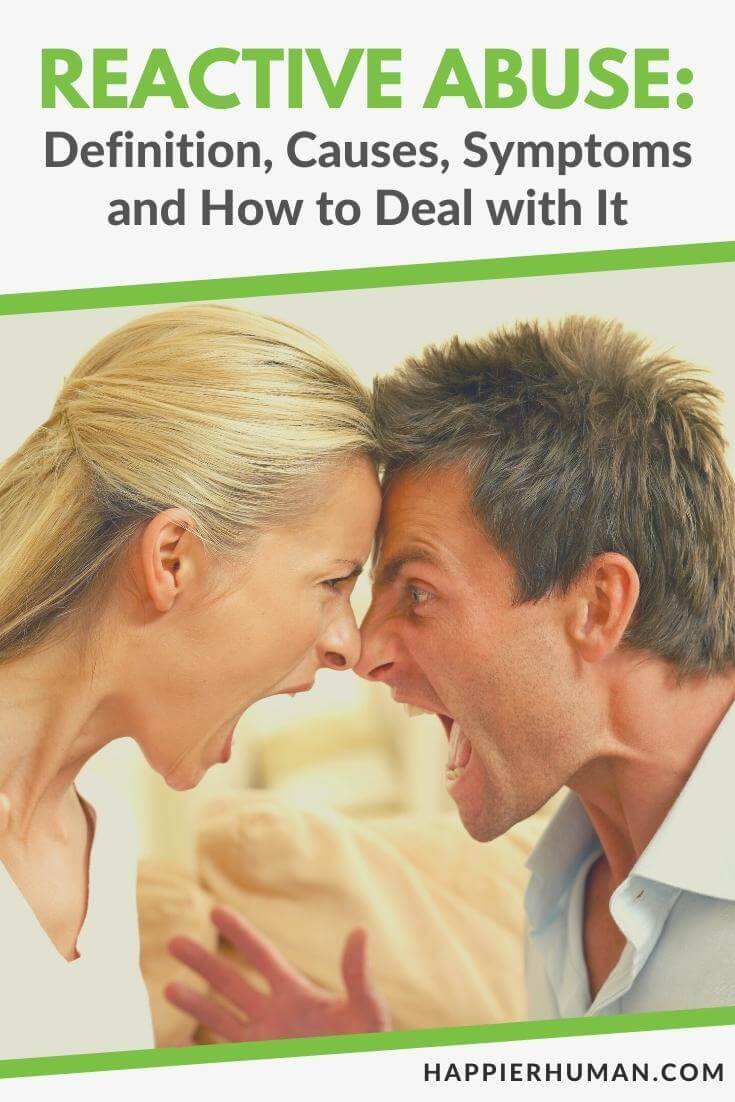A few months back, I wrote a piece on narcissistic abuse and how to recover from it. It was an excellent opportunity to refresh my knowledge on the topic and share some lessons I learned throughout my career.
Here I am once again addressing this complicated yet relevant topic.
We live in times where abuse takes subtle forms as narcissism spreads freely under the convenient excuse of “self-love.”
The reason why it's complicated is that reactive abuse represents one of the most insidious forms of gaslighting.
Often employed by narcissistic and antisocial personalities, this strategy is meant to shift the blame onto the victim, who, pushed to the limit, can react impulsively or violently.
Let me untangle the complicated knot of reactive abuse and share a few tips on dealing with it.
What is Reactive Abuse?
To get a better sense of how reactive abuse occurs, first, we need to look at gaslighting as the primary tool abusers use to break their victim's self-confidence.
In essence, gaslighting is a cluster of manipulation strategies which undermine one's sense of reality and mental stability. [1]
In other words, abusers will systematically distort relevant details of an event, thus making you question your reality and mental sanity.
Doing so will chip away at your self-esteem and make you believe that you are the “crazy” one. Any attempt to point out inappropriate or hurtful attitudes will be considered an overreaction.
Reactive abuse is a form of gaslighting in which the assailant pushes you to a point where you react violently.
The abuser will later hold this gesture against you to paint a different picture of the event.
Some will go as far as accusing you of being abusive and violent when the reality is that you were pushed to the limit and had to defend yourself.
As I said earlier, it's one of the most insidious forms of gaslighting because it turns victims into aggressors through complex manipulation strategies, which I will explain as thoroughly as possible.
There's More to Reactive Abuse Than Meets the Eye
From the start, we need to understand that any person subjected to abuse and suffering for an extended period can eventually become dependent on the abuser.
Although unconsciously, you feel that something's not right and your violent outbursts signal a much deeper pain, you still blame yourself for all those times when you shouted, insulted, or physically assaulted your abuser.

When taken out of context, these reactions may seem exaggerated and inappropriate. That's why someone who doesn't know the entire story might rush to condemn your behaviour.
For me, the first questions that come to mind are:
1. How does one get to the point where they had to react violently?
2. Is there another explanation besides blaming the perpetrator?
Unfortunately, when you're the victim of reactive abuse, you rarely have the mental clarity to sit with these questions and realize how toxic your relationship is.
You might be blaming yourself because the other person has constantly labelled you as emotionally unstable to the point where you no longer trust yourself and your judgement.
Let's delve deeper into the topic and better understand how and why abusers use this strategy.
Why (and How) Do Abusers Utilize this Strategy?
You might notice I used the word “strategy” earlier when discussing reactive abuse.
That's because abusers use this form of gaslighting to hide their toxic attitudes, slander the victim's image, and draw sympathy from people who don't know the whole story.
In general, two personality types will most likely utilize reactive abuse to manipulate the story and cover their toxic influence – antisocial and narcissistic.
Individuals with an antisocial personality often lack empathy and tend to be cynical, harsh, and contemptuous of the rights, feelings, and feelings of others.
They have an arrogant and exaggerated opinion of themselves and often dominate others with their overconfident attitude.
As for narcissists, they have an exaggerated view of their achievements and often tend to overestimate themselves while underestimating others.
They consider themselves superior, unique, and talented. They expect others to recognize and admire their ‘extraordinary' qualities.
Being friends or in a relationship with a narcissist can cause deep wounds, from loss of self-confidence to depression and anxiety.
One key element that both personalities share is emotional detachment, which seems to correlate with gaslighting behaviours. [2]
In other words, emotional detachment makes it easier for them to exercise abuse without remorse.
Distorting the Narrative
Another reason reactive abuse is so effective is that people rarely look behind closed doors.
Once again, a narcissistic or antisocial individual will use manipulation tactics to make it difficult for others to see beyond their story.
In other words, they will paint themselves as the understanding partner willing to overlook an abusive reaction because they care so much about the relationship.
In reality, the abuser has deliberately and systematically triggered their significant other to the point where they had to respond violently.
This is precisely what they've been looking for, a reason to portray their victim as the aggressor.
In many cases, others are so touched by the abuser's tear-jerking version of the story that they forget to consider the victim's perspective.
This is partly why abusers gain credibility and sympathy, sometimes even from the victim's close friends and family.
Later, I'm going to show you a case which highlights the devastating consequences that can result from gaslighting and reactive abuse.
But before we get to that part, let's take a closer look at how and why victims resort to extreme or violent gestures.
What Causes Victims to Have Violent Outbursts?
Abuse doesn't happen overnight. Instead, it is a gradual process in which the victim slowly loses their self-confidence and starts questioning their sanity.
To make a rough analogy, being in a relationship with a narcissistic or antisocial abuser is kind of like the ‘Chinese drop.'
The only difference is that you're constantly making excuses for the emotional ‘torture' you're subjected to and can't find the courage to leave.
But how could you find the courage to end the relationship when they have convinced you to cut ties with your friends and your self-esteem is in shambles?
How can you break up when you keep telling yourself that you are ‘the one with the problem' causing all that drama and emotional turmoil?
Some people stay in abusive relationships for years because they lack the emotional resources to get out or simply can't see a better life.
Others endure the emotional abuse until one day when they can't take it anymore and ‘snap'.
For someone who doesn’t know the entire story, their violent reaction may seem out of the blue, but it's a consequence of the systematic abuse they were subjected to.
The Stress Response
Another explanation for the violent outbursts that victims of reactive abuse can exhibit is the survival instinct.
Any person who feels threatened (physically or emotionally) has the potential to retaliate against their aggressor through physical, verbal, or expressive outbursts.
In situations where your mental or physical integrity is at risk, your body will naturally release stress hormones that help you cope in the event of an escalation.

Experts call it the stress response, a defence mechanism that prompts you to either flee the situation or fight against a potential aggressor.
So, when the stress response puts you in ‘fight mode', you will almost automatically resort to screaming, kicking, punching, or any other extreme gesture to discourage your abuser.
Unfortunately, an abusive partner will take this extreme gesture out of context and use it to paint you as ‘the abuser' in the eyes of your friends and even authorities.
More specifically, they can rally others around their story and even file protective orders against you.
The Devastating Consequences of Reactive Abuse
Reactive abuse involves the shifting of blame which makes the victim feel ashamed and guilty for a violent display that actually resulted from the systematic physical or emotional abuse to which the victim was subjected.
In time, this toxic relationship dynamic can cause serious medical and psychological consequences.
The Long-Term Effects of Reactive Abuse
Some of the most common problems that result from prolonged exposure to abuse include:
In some cases, the severity of the symptoms requires the intervention of medical and mental health professionals.
Things Can Get Real Ugly Real Fast
What you're about to read is the tragic case of a woman whose abusive life partner pushed her to the point where she committed a horrible act of violence.
The situation is far too complicated to establish a clear conclusion, so I advise you (the reader) to refrain from passing judgment.
Instead, try to look at this example as a lesson that helps us better understand how reactive abuse unfolds and where it can lead.
Jennifer Marchant and her boyfriend argued after a night out. When the argument became loud, the boyfriend called 911. His object: to report that Jennifer, who was on probation, had been drinking, notwithstanding the fact that he had been drinking with her for hours. The 911 operator answered, heard voices and spoke briefly to the boyfriend before the boyfriend hung up. The operator called back and tried to speak to Jennifer, and the boyfriend hung up. The operator called again, and he hung up again. Another operator called; before hanging up again, the boyfriend warned the operator that ‘”there would be trouble' if she sent the police.” She sent them anyway. Meanwhile, the boyfriend chased Jennifer around the apartment, knocking things over. Jennifer grabbed a knife from the kitchen and locked herself in the bathroom. The boyfriend broke down the bathroom door and physically assaulted her. She responded in self-defense, stabbing him once in the chest. He died, and then a jury in the Niagara County Court convicted Jennifer of manslaughter in the first degree. [3]
Reactive Abuse Can Turn Victims into Culprits
To quote the author, “this case demonstrates the process by which a victim of domestic violence, once gaslighted through the psychological manipulation of having her reality distorted by her partner and perpetrator, is then subsequently gaslighted by the criminal justice system as she is labeled a criminal defendant, despite being a survivor.”
Personally, I wouldn't want to be the judge who decides the degree to which she is guilty and sets an appropriate punishment.
As a psychologist who's worked with victims of domestic abuse, I can't help but wonder how the boyfriend's behaviour contributed to the tragic outcome.
Long story short, this example goes to show the devastating consequences that can result from abusive relationships.
5 Ways to Deal with Reactive Abuse
1. Learn to Read the Early Signs
The presence of reactive abuse clearly shows that the relationship has turned ugly.
Since abusers exert their toxic influence systematically and patiently, many victims find themselves trapped, with little resources to cope and almost no support from close friends or relatives.
Regarding early signs that could help you escape before it's too late, I think there's much to learn from how narcissistic abuse typically unfolds.
More specifically, it starts with ‘the idealization phase' when they will make grand gestures and big promises to reel you in.
Once you're committed and full of (false) hope, things will slowly turn sour. This is called ‘the devaluation stage' and is marked by criticism, guilt-tripping, and gaslighting.
The final stage is ‘the end.'
Your self-esteem is in shambles, you feel guilty for every argument, and you have no one to talk to because they've convinced you to cut ties with your loved ones a while ago.
All these attitudes and behaviours are potential red flags that should make you question the relationship dynamics.
2. Set Clear and Firm Boundaries
Let's make one thing clear right from the start.
It is perfectly normal and healthy to have boundaries even in a committed relationship.
The fact that you can't set or maintain boundaries with your significant other is a red flag, regardless of how much you love each other or how many years you've spent together.
When you've been in an abusive relationship for too long, you almost forget when boundaries are.
One example of a boundary is the skin. At a fundamental level, your skin marks the physical boundary. When the skin sustains damage, your bodily integrity is at risk.
The same goes for personal boundaries. When someone breaks a rule (boundary) that defines the limits of your interaction, it feels as if your emotional or mental integrity is at risk.
Here are some examples of boundary violations which occur in abusive relationships:
The first step in setting clear boundaries is knowing your needs, desires, aspirations, and triggers.
Without self-awareness, it's difficult to pinpoint which boundaries are important to you.
Once you understand what's important to you and which aspects of life you are not willing to overlook or compromise, you will know which boundaries to set.
But just because you set boundaries doesn't mean others will respect them, especially when dealing with an abusive partner.
Sometimes, consistency (restating your needs) will help you set firm boundaries. Other times, you just must take a step back and ask yourself if it's worth sacrificing your boundaries for the sake of the relationship.
3. The Grey-Rock Method
The grey-rock method is a trick that helps you prevent toxic individuals from turning ordinary situations into dramas that cause you negative moods and put you at risk of having an extreme reaction.
Acting calm and somewhat uninterested when an abuser attempts to push your buttons will most likely discourage them from dragging you into a heated argument where you may react violently.

In essence, whenever you feel like they're trying to start an argument, try to talk in a neutral voice, offer brief and straightforward words and steer clear of hot topics.
While the grey rocking can temporarily keep your abuser at a distance, it's not something you should use long-term.
Furthermore, it would be best if you avoided this technique in situations where there is imminent danger.
4. If Possible, Take a Time Out When the Argument Gets too Heated
If your partner manages to push your buttons and you do get into a heated argument, take some time out.
I know you may feel like throwing some ultimatums at your significant other but refrain from doing that and tell your partner you need some time to cool off.
During your time-out, avoid alcohol, drugs, or other unhealthy coping mechanisms and practice something self-soothing that helps you calm down healthily.
Furthermore, don't ruminate on what you'll say when you resume the discussion. You will only arm yourself to continue a conflict you ought to de-escalate.
Lastly and most importantly, resume the discussion and try to de-escalate the conflict as soon as you manage to clear your head.
As you've probably noticed, both the grey-rock method and the time-out are meant to help you avoid escalating the situation at all costs.
However, don't take these strategies as a one-size-fits-all solution.
Sometimes, your partner may disregard your boundaries, deny your attempt to take a break, and force you to remain in a heated argument.
If you feel like your physical or emotional well-being is in danger, find a safe place when possible, and contact a close friend or domestic violence hotline.
5. Stay in Touch with Your Loved Ones
It's not uncommon for narcissistic abusers to try to separate you from family, close friends, and social circles.
This is one of the many strategies they use to get a firm grip on your perspective and twist it to the point where you lose confidence in what you believe is right or wrong.
Never cut ties with your loved ones, no matter how good you feel in a relationship and how much you care about your significant other.
Your social circles are a valuable resource, a space where you can share experiences and receive emotional support.
Furthermore, a close friend or family member who loves you and cares about you can provide a fresh perspective in those situations where you're not quite sure if you're overreacting or if your significant other has deliberately pushed your buttons.
I'm not saying you should always consider your friends' relationship advice valid. Relationship issues should be discussed and solved with your significant other.
Bottom line, whether it's from a friend, family member, or even a couple's counsellor, it's always wise to seek an outside perspective.
Final Thoughts on Reactive Abuse
Reactive abuse is a subtle form of gaslighting in which the abuser pushes your buttons to the point where you react violently only to hold this gesture against you.
Given that abuse unfolds gradually, it's difficult for victims to notice the toxic relationship dynamics in which they're slowly losing themselves.
To avoid reaching the point where you might do something regrettable, it's vital to:
References
| [1] | E. Hightower, “An Exploratory Study of Personality Factors Related to Psychological Abuse and Gaslighting,” William James College ProQuest Dissertations Publishing, 2017. |
| [2] | P. Miano, M. Bellomare and V. G. Genova, “Personality correlates of gaslighting behaviours in young adults,” Journal of Sexual Aggression, vol. 27, no. 3, pp. 285-298, 2021. |
| [3] | D. R. Knapp, “FANNING THE FLAMES: GASLIGHTING AS A TACTIC OF PSYCHOLOGICAL ABUSE AND CRIMINAL PROSECUTION.,” Albany Law Review, vol. 83, no. 1, 2019. |

Alexander Draghici is a licensed Clinical Psychologist, CBT practitioner, and content writer for various mental health websites. His work focuses mainly on strategies designed to help people manage and prevent two of the most common emotional problems – anxiety and depression.


